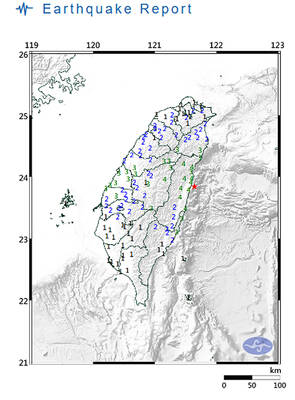US policy toward Taiwan has been irrevocably changed by US Secretary of State Mike Pompeo’s comment on Thursday that “Taiwan has not been a part of China,” a National Taiwan University academic said on Saturday.
The comments that Pompeo made during a telephone interview with the Hugh Hewitt Show radio program aired on Thursday has drawn attention from all sides of the issue, as it has been US practice since the signing of the Shanghai Communique in 1972 to simply “acknowledge” rather than “recognize” that people on either side of the Taiwan Strait maintain there is “one China.”
Pompeo’s comment was made in relation to the forced expulsion of four pro-democracy lawmakers in Hong Kong the day before, as he said that the move exposes Beijing’s “blatant disregard for its international commitments” and shows it cannot be trusted, associate professor of political science Chen Shih-min (陳世民) said.
US policy toward Taiwan has been founded on Beijing’s promises, including its promise to resolve the Taiwan question peacefully, he said.
However, now that Washington has realized that Beijing cannot be trusted when it comes to Taiwan and Hong Kong, it also believes there is no reason to comply with past agreements, he added.
With a single comment, Pompeo has set a new framework for US-Taiwan relations that is closer to the “status quo” desired by pro-Taiwan factions of the Republican Party, Chen said, adding that even after US president-elect Joe Biden takes office, it would be difficult to return to the former “status quo.”
Cross-Strait Policy Association researcher Wu Se-chih (吳瑟致) said that Pompeo’s remark would limit cross-strait policy options for the Biden administration, as rejecting the statement would conversely affirm Beijing’s stance, revealing the US’ bottom line in negotiations.
Although the US might not be stable during the transition of power, Pompeo’s comment shows that Washington’s approach has “somewhat changed,” former minister of foreign affairs Chen Chien-jen (程建人) said.
The remark is bound to affect bilateral and trilateral relations, although the breadth of the change is yet to be determined, he added.
There is no way that Biden would follow Trump’s policies to the letter, but it is too early for Taiwan to draw any conclusions yet, Chen Chien-jen said, adding that it is more important to first observe China’s reaction.
Former deputy minister of foreign affairs Michael Kau (高英茂) said he does not believe the Biden administration would reiterate Pompeo’s position.
However, the remark would serve to ensure that the US’ “one China” policy is decided by Washington, not Beijing, he added.
Additional reporting by Peng Wan-hsin

A small number of Taiwanese this year lost their citizenship rights after traveling in China and obtaining a one-time Chinese passport to cross the border into Russia, a source said today. The people signed up through Chinese travel agencies for tours of neighboring Russia with companies claiming they could obtain Russian visas and fast-track border clearance, the source said on condition of anonymity. The travelers were actually issued one-time-use Chinese passports, they said. Taiwanese are prohibited from holding a Chinese passport or household registration. If found to have a Chinese ID, they may lose their resident status under Article 9-1

PROBLEMATIC APP: Citing more than 1,000 fraud cases, the government is taking the app down for a year, but opposition voices are calling it censorship Chinese Nationalist Party (KMT) Chairwoman Cheng Li-wun (鄭麗文) yesterday decried a government plan to suspend access to Chinese social media platform Xiaohongshu (小紅書) for one year as censorship, while the Presidential Office backed the plan. The Ministry of the Interior on Thursday cited security risks and accusations that the Instagram-like app, known as Rednote in English, had figured in more than 1,700 fraud cases since last year. The company, which has about 3 million users in Taiwan, has not yet responded to requests for comment. “Many people online are already asking ‘How to climb over the firewall to access Xiaohongshu,’” Cheng posted on

Taiwanese were praised for their composure after a video filmed by Taiwanese tourists capturing the moment a magnitude 7.5 earthquake struck Japan’s Aomori Prefecture went viral on social media. The video shows a hotel room shaking violently amid Monday’s quake, with objects falling to the ground. Two Taiwanese began filming with their mobile phones, while two others held the sides of a TV to prevent it from falling. When the shaking stopped, the pair calmly took down the TV and laid it flat on a tatami mat, the video shows. The video also captured the group talking about the safety of their companions bathing

A magnitude 5.7 earthquake yesterday struck off the coast of Hualien, causing brief transportation disruptions in northern and eastern Taiwan, as authorities said that aftershocks of magnitude 5 or higher could occur over the next three days. The quake, which hit at 7:24pm at a depth of 24.5km, registered an intensity of 4 in Hualien and Nantou counties, the Central Weather Administration (CWA) said. There were no immediate reports of damage or injuries. In Taipei, the MRT railway’s operations control center received an earthquake alert and initiated standard safety procedures, briefly halting trains on the Bannan (blue) line for about a minute.